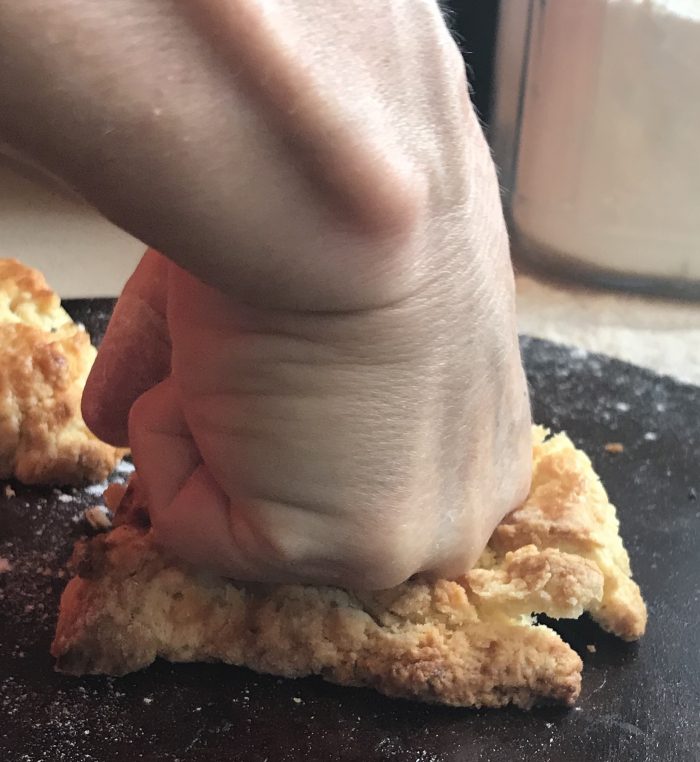Can I be mindful, kind, and angry in the kitchen?
Dump the flour in the bowl. Step one. Angry sigh. Step two—I can’t remember step two. I rub my head.
It took me my whole life to face my truth. I am a decent cook, I can create food that is delicious and even sometimes sublime, but my skills mean nothing when I am distracted, reacting, or just letting my anger be in charge. Then, whatever I throw together in the kitchen has a good chance of being inedible. Reaction, over-thinking, locked in judgment about my completely correct point of view, all these are poison to a lovely baked scone.
I made my first baked scone when I moved to the Pacific Northwest. At the state fair, the line for hot scones is as long as the one for the roller coaster, and when they hand you that warm envelope with a crisp scone stuffed inside, the butter and raspberry jam oozing out, the first bite is crunchy, and the rest sweet, soft, and crumbly. I found a recipe we liked at our favorite Mom and Pop café. Mom kindly shared the recipe, and vanilla scones became a rainy day tradition. We lived near Seattle, so you can imagine the exponential number of scones consumed.
My husband’s favourite is ginger scones with lemon glaze, and I really intended to bake those for him that day when we erupted in an argument about…I don’t remember what. We didn’t resolve anything, I slammed things around in the kitchen, muttering into my bowl how much I was right and he was wrong.
When I pulled out the baking stone from the oven, it was apparent that the bumpy mass was a non-mindfully baked eruption. Sigh. About as tasty as the dust of Mt. Vesuvius, we tried to eat a few dry bites and gave up.
My husband caught my eye, grinning: “Baking angry.”
There it was—I laughed. Amusement, connection, these are rich ingredients for me to forgive myself, to find care and love for both my disastrous messes and my delightful concoctions.
All my growing up happens in this pause before I react. I choose to breathe. First, I ground myself, feeling my feet on the kitchen floor, feeling my energy returning as gentle waves of breath bring me to focus calm. A little amusement ripples in.
Baking scones mindfully is carefully spooning in the flour, all my focus on rubbing the butter between my fingers, twirling the spoon with a few quick turns, breathing softly as I gather the mass of dough, gently, gently, like I would cradle the face of my beloved. No beating, no kneading—just slow tai chi style folding once or twice, quick cuts to the dough, and triangles onto the baking stone, rising just so as it bakes.
If a flaky piecrust and a tender muffin got it on, this goodness is the happy baby.
Mindful flow in the kitchen creates my little heaven.
Like so many during COVID-19 lockdown, baking bread, pies, cookies, scones—any baked good—feels like home. With times like these, my daughter and I agreed we needed more than scones; we needed to pound dough on the counter, knead until our fists hurt, and work out the fear, anxiety, anger, and confusion.
Sometimes you just need to pound some bread dough, because you can’t do anything else.
Surfing for recipes during the worst of the lockdown in the spring, my daughter and I found a link for a #ZoomChallahBake, a weekly Challah loaf making session in the kitchen with noted author, award-winning filmmaker, and overall wonderful human Tiffany Schlain. If you are interested in her nonprofit work, check out letitripple.org, She created a short film about the Friday challah bakes—I think there have been almost 20 of them now. Tiffany and her team continue these bakes once or twice a month.
Each week, we looked forward to Friday. For some weeks it was all we had to look forward to: that ritual, that consistency, the interesting dialogue with many guests while we pounded dough and let it rise. The shared feelings, ideas, inspiration, hope, and forgiveness—it all made the mundane task of baking a loaf of bread an act of sacred human connection.
Also, we decided online Challah Bakes are for when the anger you feel at the whole world gets the sh*t beat out of it.
The philosophy, Tiffany says, is simple. “Keep kneading.”
During one Friday bake, angry rants showed up in the chat, meant to stir anger and cause a reaction. So fast, quicker than I could think to breathe, my throat constricted and my face got hot. How dare they ruin this lovely ritual with their ALL CAPS screaming? I realized I was pounding the dough into my kitchen counter. I think I might have cracked the granite a little.
Then, magically, I sighed. I believe it was my soul’s attempt to remind me I needed some space, and breath can do just that. A little love and tenderness flowing up. Mindful self-care that my innards are providing for me. Here was my “maitri“—unconditional friendship with myself, as Pema Chödrön teaches.
I paused long enough to hear the guest Rabbi talking about forgiveness. I listened. I kept kneading. The dough became strong and elastic. I braided it into a smooth Challah loaf that nourished us later. I am learning that anger can be a tool, a catalyst for change.
Anger rises. It just does—and with the culture of anger in the air, it infects my soul easily. I can let it ride me as I blame everyone around me, and scream, “But I am right!” but then I am not in love with myself or anything else.
Instead, I can feel my anger, allow it, breathe with it, and just keep kneading. And then, maybe, I rise.
 Share on bsky
Share on bsky






Read 11 comments and reply